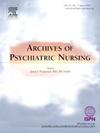关于土耳其综合医院护士心理健康知识与精神疾病观念之间关系的调查
IF 2.2
4区 医学
Q1 NURSING
引用次数: 0
摘要
研究旨在确定全科护士的心理健康素养与对精神疾病的信念之间的关系。研究涉及土耳其西部三家医院的 285 名护士,年龄在 23 岁至 47 岁之间,他们在 2023 年 12 月至 2024 年 3 月期间完成了心理健康素养量表(MHLS)和对精神疾病的信念量表(BMIS)。115, p = 0.018)、对精神疾病有一定了解(F = 8.177, p <0.001)、愿意接受精神疾病培训(t = 1.673, p = 0.048)、在工作单位遇到过精神疾病患者(F = 11.233, p <0.001)和在工作单位照顾过精神疾病患者(t = 1.808, p = 0.036)的人具有较高的心理健康素养水平。护士对精神疾病的消极信念水平与其心理健康素养之间存在负相关(r = -0.432,p <0.001)。因此,精神科心理健康护士可以通过对普通护士进行心理健康教育,积极预防负面观念的产生,并提高对精神疾病的认识。对于那些在学生时代没有接受过精神障碍培训的人,对精神障碍知识知之甚少的人,不愿意接受精神障碍培训的人,以及在各自的工作单位中可能会遇到精神障碍患者的护士群体,应该给予更多的重视。本文章由计算机程序翻译,如有差异,请以英文原文为准。
A survey on the relationship between mental health literacy and beliefs toward mental illness among nurses in general hospitals in Turkey
Aim
The study aimed to determine the relationship between general nurses' mental health literacy and beliefs toward mental illness.
Method
The study involved 285 nurses aged 23 to 47 from three hospitals in western Turkey, who completed the Mental Health Literacy Scale (MHLS) and the Beliefs Toward Mental Illness Scale (BMIS) between December 2023 and March 2024.
Results
Those who received training on mental illnesses as students (t = 2.115, p = 0.018), those who had moderate knowledge about mental illnesses (F = 8.177, p < 0.001), those who were willing to receive training on mental illnesses (t = 1.673, p = 0.048), those who encounter individuals with mental illness in their work units (F = 11.233, p < 0.001) and those who care for individuals with mental illness in their work units (t = 1.808, p = 0.036) have higher mental health literacy levels. There was a negative relationship between nurses' negative beliefs toward mental illness levels and their mental health literacymental health literacy levels (r = −0.432, p < 0.001).
Conclusion
Mental health literacy is a crucial element in reducing general nurses' negative beliefs about mental illnesses. Thıus, psychiatric mental health nurses can actively prevent negative beliefs and increase awareness by providing mental health education to general nurses. Awareness programs should be accorded greater emphasize on individuals who are not trained in mental disorders when they are students, those who have low knowledge about mental disorders, those who are reluctant to receive training on mental disorders, and cohorts of nurses who are likely to encounter patients with mental disorders in their respective work units.
求助全文
通过发布文献求助,成功后即可免费获取论文全文。
去求助
来源期刊
CiteScore
3.70
自引率
0.00%
发文量
131
审稿时长
160 days
期刊介绍:
Archives of Psychiatric Nursing disseminates original, peer-reviewed research that is of interest to psychiatric and mental health care nurses. The field is considered in its broadest perspective, including theory, practice and research applications related to all ages, special populations, settings, and interdisciplinary collaborations in both the public and private sectors. Through critical study, expositions, and review of practice, Archives of Psychiatric Nursing is a medium for clinical scholarship to provide theoretical linkages among diverse areas of practice.

 求助内容:
求助内容: 应助结果提醒方式:
应助结果提醒方式:


